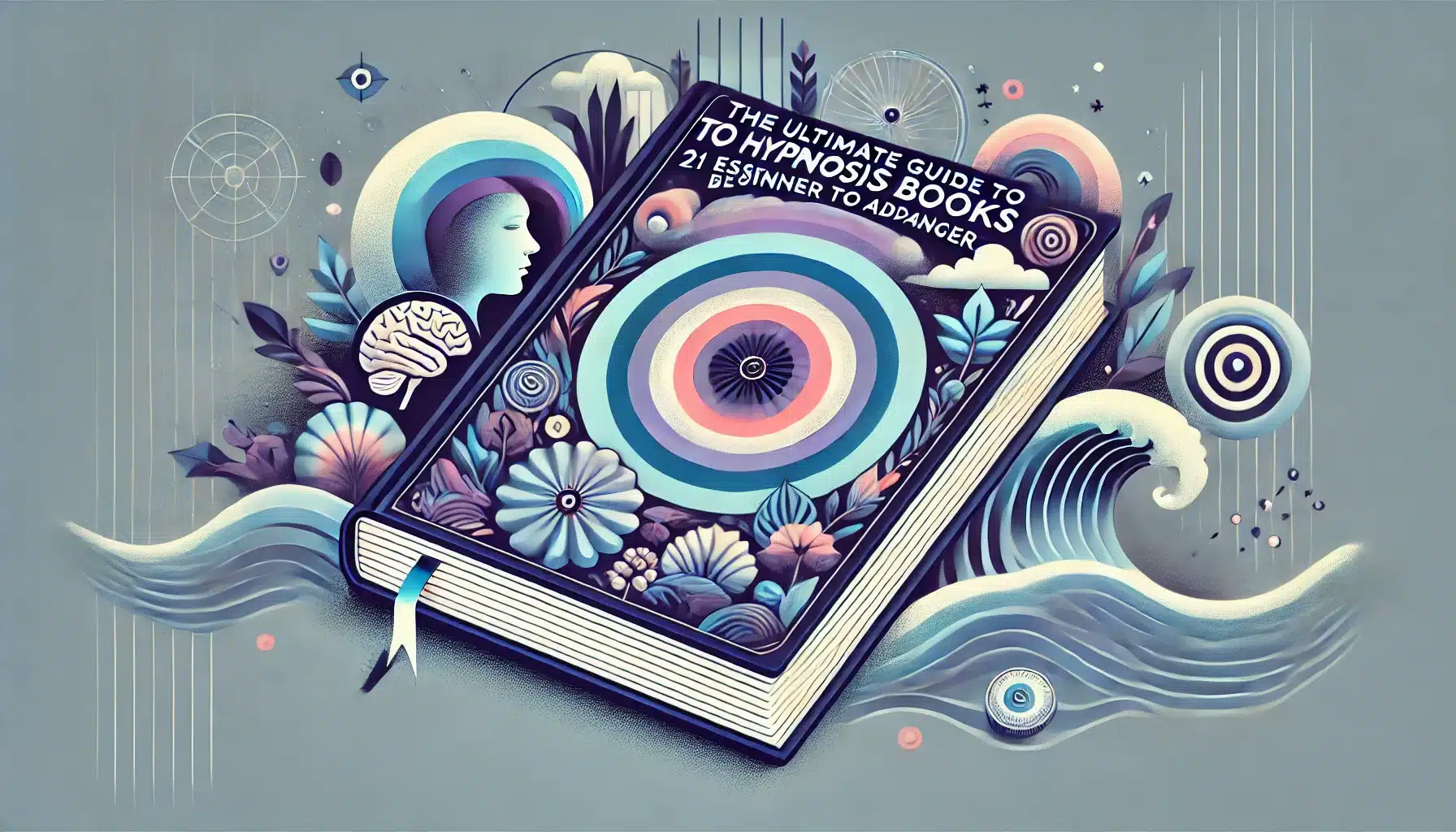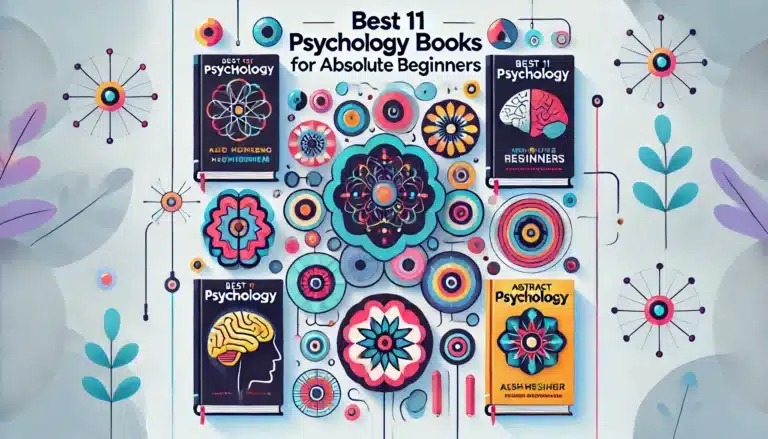The Ultimate Guide to Hypnosis Books: 21 Best Reads from Beginner to Advanced
Introduction
Hypnosis has long been a subject of fascination, intrigue, and, sometimes, skepticism. From ancient practices to modern-day therapeutic applications, hypnosis offers a gateway to understanding and influencing the subconscious mind. Whether you are a beginner curious about its potential or an advanced practitioner looking to refine your skills, the right resources can significantly enhance your knowledge and effectiveness.
In this comprehensive guide, we will explore the 21 best books on hypnosis, categorized from beginner to advanced levels. These books have been carefully selected to provide a broad and deep understanding of hypnosis, covering everything from foundational techniques to advanced therapeutic applications.
Common Questions About Hypnosis
What is Hypnosis? Hypnosis is a state of focused attention, heightened suggestibility, and deep relaxation. It is often used in therapeutic settings to help individuals manage pain, reduce stress, overcome phobias, and improve various aspects of their lives.
Can Hypnosis Be Self-Taught? Yes, hypnosis can be self-taught to a certain extent. Many books provide comprehensive guides on self-hypnosis techniques, allowing individuals to practice and master the basics at their own pace. However, for more advanced techniques and therapeutic applications, formal training and guidance from a certified hypnotherapist are recommended.
Do Hypnosis Books Really Work? Hypnosis books can be highly effective if they are well-written and based on sound scientific principles. They offer valuable insights, practical exercises, and scripts that can help readers learn and practice hypnosis. Success largely depends on the reader’s commitment to practice and apply the techniques consistently.
Is Hypnosis Safe? When conducted by a trained professional or practiced correctly using reliable resources, hypnosis is generally safe. It is a natural state of mind that people experience daily, such as when daydreaming or becoming absorbed in a book or movie.
How Can Hypnosis Help Me? Hypnosis can help in various ways, including stress reduction, pain management, improving sleep, enhancing performance, overcoming bad habits, and addressing psychological issues like anxiety and depression. It works by tapping into the subconscious mind, where lasting change and healing can occur.
By addressing these common questions and providing a curated list of the best hypnosis books, this guide aims to equip you with the knowledge and resources needed to explore and harness the power of hypnosis. Whether you’re just starting or looking to deepen your expertise, these books offer a valuable roadmap for your journey into the fascinating world of hypnosis.
Disclaimer
While hypnosis can be a powerful tool for personal development and therapeutic change, it is not a substitute for professional medical or psychological advice. If you have any medical or psychological conditions, or if you are seeking hypnosis for therapeutic purposes, it is strongly recommended to consult with a certified hypnotherapist or healthcare provider. Always ensure that any hypnotherapy you undertake is guided by a qualified professional.
Beginner Level
1. Hypnosis for Beginners: Reach New Levels of Awareness & Achievement by William W. Hewitt
- Description: William W. Hewitt’s “Hypnosis for Beginners” serves as an excellent entry point into the world of hypnosis. The book demystifies the concept of hypnosis, explaining how it works and how anyone can use it to enhance personal development and achieve goals. With easy-to-follow instructions and a variety of practical exercises, Hewitt guides readers through the process of self-hypnosis, offering scripts and techniques that can be used to improve memory, increase concentration, and manage stress. The book’s approachable language and structured format make it accessible for beginners who are eager to explore the potential of their subconscious mind.
- Author: William W. Hewitt is a seasoned hypnotherapist and author, known for his practical approach to teaching hypnosis. His work emphasizes the everyday applications of hypnosis, making complex concepts easy to understand for newcomers.
- Why You Should Read This Book: It’s a perfect starting point for those new to hypnosis, providing foundational knowledge and practical exercises to build confidence and skill.
- Link from Amazon
2. The New Hypnotherapy Handbook: Hypnosis and Mindbody Healing by Kevin Hogan
- Description: Kevin Hogan’s “The New Hypnotherapy Handbook” offers a thorough introduction to hypnotherapy, blending traditional techniques with contemporary mind-body healing practices. The book covers a broad spectrum of topics, including stress reduction, overcoming phobias, and improving overall well-being through hypnosis. Hogan provides a solid theoretical foundation while also emphasizing practical application, making the book a valuable resource for both personal development and professional use. Each chapter includes exercises and case studies that illustrate the effectiveness of hypnotherapy in real-world scenarios.
- Author: Kevin Hogan is a highly regarded hypnotherapist and motivational speaker with extensive experience in the fields of psychology and mind-body healing.
- Why You Should Read This Book: It blends traditional hypnosis techniques with contemporary therapeutic practices, making it a versatile resource for beginners.
- Link from Amazon
3. Self-Hypnosis: The Complete Manual for Health and Self-Change by Brian M. Alman and Peter Lambrou
- Description: In “Self-Hypnosis: The Complete Manual for Health and Self-Change,” authors Brian M. Alman and Peter Lambrou provide a comprehensive guide to using self-hypnosis for personal growth and health improvement. The book is filled with practical techniques and step-by-step instructions for a variety of self-hypnosis methods. Topics include managing pain, reducing stress, overcoming fears, and enhancing performance in different areas of life. With detailed scripts and exercises, this manual is designed to help readers tap into their subconscious mind to achieve positive changes and reach their full potential.
- Author: Brian M. Alman and Peter Lambrou are both experienced hypnotherapists and psychologists, recognized for their contributions to the field of self-hypnosis and personal development.
- Why You Should Read This Book: It’s a practical manual for anyone interested in learning how to use self-hypnosis effectively for personal growth and healing.
- Link from Amazon
4. Hypnosis: A Comprehensive Guide by Tad James and Lorraine Flores
- Description: “Hypnosis: A Comprehensive Guide” by Tad James and Lorraine Flores is an extensive exploration of hypnosis, covering its history, techniques, and applications in various fields. The book delves into the theoretical aspects of hypnosis, providing a thorough understanding of how and why it works. It also offers practical exercises and case studies that demonstrate the effectiveness of hypnosis in different contexts, such as therapy, personal development, and even performance enhancement. This guide is ideal for those who want to gain a deep and broad understanding of hypnosis and its many uses.
- Author: Tad James and Lorraine Flores are experienced hypnotherapists and trainers, known for their in-depth knowledge and practical approach to teaching hypnosis.
- Why You Should Read This Book: It’s a comprehensive introduction to hypnosis, suitable for beginners who want to understand the broader context and applications of hypnosis.
- Link from Amazon
5. The Everything Self-Hypnosis Book: Learn to Use Your Mental Power to Take Control of Your Life by Rene A. Bastarache
- Description: Rene A. Bastarache’s “The Everything Self-Hypnosis Book” is a user-friendly guide that teaches readers how to harness the power of their minds through self-hypnosis. The book covers the basics of self-hypnosis, including how to create effective suggestions, induce a trance state, and use self-hypnosis to achieve various personal goals. Bastarache provides a range of practical exercises and tips for using self-hypnosis to improve health, boost confidence, and enhance mental clarity. The straightforward language and step-by-step approach make this book accessible to anyone interested in exploring the potential of self-hypnosis.
- Author: Rene A. Bastarache is a certified hypnotherapist and author, known for his clear and practical approach to teaching self-hypnosis.
- Why You Should Read This Book: It offers a user-friendly introduction to self-hypnosis, making it accessible to anyone interested in improving their mental and physical well-being.
- Link from Amazon
Intermediate Level
6. Monsters and Magical Sticks: There’s No Such Thing as Hypnosis? by Steven Heller and Terry Steele
- Description: “Monsters and Magical Sticks” by Steven Heller and Terry Steele is a fascinating exploration of the power of the subconscious mind and the myths surrounding hypnosis. The book challenges the conventional understanding of hypnosis, presenting advanced techniques and concepts that delve into the deeper aspects of the human psyche. Heller and Steele use engaging metaphors and stories to explain complex ideas, making the book both informative and entertaining. This work is perfect for those who have a basic understanding of hypnosis and want to explore more sophisticated methods and applications.
- Author: Steven Heller and Terry Steele are experienced hypnotherapists and authors, known for their innovative and thought-provoking approaches to hypnosis.
- Why You Should Read This Book: It’s a thought-provoking and insightful book that challenges conventional views on hypnosis, making it ideal for those with some experience in the field.
- Link from Amazon
7. Hypnotherapy Scripts: A Neo-Ericksonian Approach to Persuasive Healing by Ronald A. Havens and Catherine Walters
- Description: In “Hypnotherapy Scripts,” Ronald A. Havens and Catherine Walters provide a valuable collection of scripts based on the principles of Milton H. Erickson. This book is designed to help hypnotherapists incorporate Ericksonian techniques into their practice, offering scripts that cover a wide range of therapeutic scenarios. The authors provide detailed explanations of each script, discussing their theoretical foundations and practical applications. This book is an excellent resource for hypnotherapists who are familiar with basic hypnosis techniques and want to deepen their practice with advanced, nuanced approaches.
- Author: Ronald A. Havens and Catherine Walters are experts in Ericksonian hypnotherapy, known for their practical and effective scripts.
- Why You Should Read This Book: It’s an excellent resource for intermediate practitioners looking to enhance their therapeutic techniques with advanced Ericksonian scripts.
- Link from Amazon
8. Mind Play: A Guide to Erotic Hypnosis by Mark Wiseman
- Description: “Mind Play” by Mark Wiseman offers a comprehensive guide to the niche field of erotic hypnosis. The book provides detailed instructions and techniques for using hypnosis in consensual adult relationships, focusing on safety, ethics, and effective communication. Wiseman covers a range of topics, including creating hypnotic scripts, inducing trance states, and using hypnosis to enhance intimacy and pleasure. This book is an excellent resource for those who have a foundational understanding of hypnosis and are interested in exploring its erotic applications in a responsible and informed manner.
- Author: Mark Wiseman is a well-known hypnotist and author specializing in erotic hypnosis.
- Why You Should Read This Book: It’s a unique and comprehensive guide to a specialized area of hypnosis, making it suitable for intermediate practitioners interested in exploring new applications.
- Link from Amazon
9. The Wizard Within: The Krasner Method of Clinical Hypnotherapy by A. M. Krasner
- Description: A. M. Krasner’s “The Wizard Within” introduces readers to the Krasner Method, a systematic approach to clinical hypnotherapy. The book covers the theoretical foundations of this method, as well as practical techniques for effective hypnotherapy. Krasner provides detailed instructions and case studies that illustrate how his method can be used to treat various conditions, including anxiety, phobias, and chronic pain. This book is ideal for hypnotherapists who want to deepen their knowledge and skills with a structured and proven approach to clinical hypnosis.
- Author: A. M. Krasner is a respected hypnotherapist and educator known for his innovative methods.
- Why You Should Read This Book: It offers a structured approach to clinical hypnotherapy, making it ideal for practitioners seeking to refine their therapeutic techniques.
- Link from Amazon
10. Hypnosis for Inner Conflict Resolution: Introducing Parts Therapy by Roy Hunter
- Description: “Hypnosis for Inner Conflict Resolution” by Roy Hunter introduces Parts Therapy, a powerful technique for resolving inner conflicts through hypnosis. The book provides a comprehensive overview of Parts Therapy, including its theoretical foundations and practical applications. Hunter includes detailed case studies and exercises that demonstrate how Parts Therapy can be used to address issues such as self-sabotage, inner turmoil, and conflicting desires. This book is a valuable resource for hypnotherapists who want to expand their toolkit with advanced techniques for inner conflict resolution.
- Author: Roy Hunter is a renowned hypnotherapist and trainer known for his work in Parts Therapy.
- Why You Should Read This Book: It’s a valuable resource for intermediate practitioners looking to expand their therapeutic toolkit with advanced techniques for conflict resolution.
- Link from Amazon
11. Hypnotherapy: A Handbook by Dave Elman
- Description: Dave Elman’s “Hypnotherapy” is a classic text that covers a wide range of hypnotherapy techniques and applications. The book provides a thorough introduction to Elman’s methods, which are known for their effectiveness and efficiency. Elman includes detailed instructions and case studies that demonstrate how his techniques can be used to treat various conditions, from pain management to overcoming phobias. This book is an essential resource for hypnotherapists who want to learn from one of the pioneers in the field and incorporate proven techniques into their practice.
- Author: Dave Elman was a pioneering hypnotherapist known for his innovative techniques and teaching methods.
- Why You Should Read This Book: It’s a timeless resource for hypnotherapists, offering practical techniques and insights from one of the field’s pioneers.
- Link from Amazon
12. The Art of Hypnosis: Mastering Basic Techniques by C. Roy Hunter
- Description: C. Roy Hunter’s “The Art of Hypnosis” provides a comprehensive guide to mastering the basic techniques of hypnosis. The book covers a wide range of topics, including inducing trance states, creating effective suggestions, and using hypnosis for various therapeutic purposes. Hunter includes practical exercises and tips that help readers build a solid foundation in hypnosis. This book is ideal for those who have a basic understanding of hypnosis and want to refine their skills and gain confidence in their practice.
- Author: C. Roy Hunter is a respected hypnotherapist and educator known for his clear and practical writing.
- Why You Should Read This Book: It’s an essential guide for intermediate practitioners seeking to master the basics of hypnosis and build a solid foundation for advanced practice.
- Link from Amazon
13. Hypnosis for Change by Josie Hadley and Carol Staudacher
- Description: “Hypnosis for Change” by Josie Hadley and Carol Staudacher offers practical techniques for using hypnosis to achieve personal and professional change. The book covers a wide range of topics, from stress reduction and habit change to improving self-esteem and enhancing creativity. Hadley and Staudacher provide detailed instructions and case studies that illustrate how hypnosis can be used effectively for personal growth and development. This book is a valuable resource for hypnotherapists who want to help their clients make positive changes in their lives.
- Author: Josie Hadley and Carol Staudacher are experienced hypnotherapists and authors known for their practical approach to hypnosis.
- Why You Should Read This Book: It’s a versatile resource for intermediate practitioners looking to use hypnosis for personal and professional development.
- Link from Amazon
14. Hypnotic Realities: The Induction of Clinical Hypnosis and Forms of Indirect Suggestion by Milton H. Erickson, Ernest L. Rossi, and Sheila I. Rossi
- Description: “Hypnotic Realities” by Milton H. Erickson, Ernest L. Rossi, and Sheila I. Rossi presents the innovative techniques of Milton H. Erickson, a pioneer in medical hypnosis. The book provides detailed explanations of Erickson’s methods for inducing trance states and using indirect suggestions to achieve therapeutic outcomes. The authors include case studies and practical examples that illustrate the effectiveness of Erickson’s techniques in various clinical settings. This book is an essential resource for hypnotherapists who want to learn advanced induction and suggestion techniques from one of the field’s most influential figures.
- Author: Milton H. Erickson, Ernest L. Rossi, and Sheila I. Rossi are renowned experts in the field of hypnosis and psychotherapy.
- Why You Should Read This Book: It’s an essential resource for intermediate practitioners interested in learning advanced induction and suggestion techniques from one of the field’s pioneers.
- Link from Amazon
15. Trancework: An Introduction to the Practice of Clinical Hypnosis by Michael D. Yapko
- Description: Michael D. Yapko’s “Trancework” is a comprehensive guide to the theory and practice of clinical hypnosis. The book covers a wide range of topics, including the principles of hypnosis, techniques for inducing trance states, and practical applications for various therapeutic purposes. Yapko provides detailed instructions, case studies, and practical exercises that help readers develop their skills and confidence in using hypnosis. This book is ideal for hypnotherapists who want to deepen their understanding and practice of clinical hypnosis.
- Author: Michael D. Yapko is a respected clinical psychologist and hypnotherapist known for his expertise in the field of hypnosis.
- Why You Should Read This Book: It’s a thorough and practical guide for intermediate practitioners seeking to deepen their understanding and skills in clinical hypnosis.
- Link from Amazon
Advanced Level
16. The Collected Works of Milton H. Erickson, M.D. by Milton H. Erickson
- Description: “The Collected Works of Milton H. Erickson” offers a comprehensive collection of the complete works of one of the most influential figures in the field of hypnosis. This extensive anthology includes Erickson’s groundbreaking research, innovative techniques, and detailed case studies. Readers will gain deep insights into Erickson’s approach to hypnosis and psychotherapy, as well as his contributions to the understanding of the subconscious mind. This collection is an invaluable resource for advanced practitioners who want to study the complete works of a pioneer in the field and apply his techniques in their practice.
- Author: Milton H. Erickson was a pioneering psychiatrist and hypnotherapist known for his groundbreaking work in medical hypnosis.
- Why You Should Read This Book: It’s an invaluable resource for advanced practitioners seeking to study the complete works of one of the most influential figures in the field of hypnosis.
- Link from Amazon
17. Patterns of the Hypnotic Techniques of Milton H. Erickson, M.D. Volume 1 by Richard Bandler and John Grinder
- Description: “Patterns of the Hypnotic Techniques of Milton H. Erickson, M.D. Volume 1” by Richard Bandler and John Grinder is a detailed analysis of the hypnotic techniques developed by Milton H. Erickson. The book provides in-depth explanations of Erickson’s methods for inducing trance states and using indirect suggestions. Bandler and Grinder, co-founders of Neuro-Linguistic Programming (NLP), offer insights into how Erickson’s techniques can be applied in various therapeutic contexts. This book is essential for advanced practitioners who want to learn the detailed techniques of Milton H. Erickson from two leading experts in the field.
- Author: Richard Bandler and John Grinder are co-founders of Neuro-Linguistic Programming (NLP) and experts in the field of hypnosis and communication.
- Why You Should Read This Book: It’s an essential resource for advanced practitioners interested in learning the detailed techniques of Milton H. Erickson from two leading experts in the field.
- Link from Amazon
18. Advanced Ericksonian Hypnotherapy Scripts by Dan Short
- Description: Dan Short’s “Advanced Ericksonian Hypnotherapy Scripts” provides a valuable collection of advanced hypnotherapy scripts based on the principles of Milton H. Erickson. The book includes detailed explanations and practical guidance for using these scripts in therapeutic settings. Short offers a variety of scripts that address different therapeutic needs, such as anxiety, depression, and pain management. This book is an excellent resource for advanced practitioners who want to enhance their therapeutic techniques with sophisticated Ericksonian scripts.
- Author: Dan Short is a respected hypnotherapist and educator known for his expertise in Ericksonian hypnotherapy.
- Why You Should Read This Book: It’s a valuable resource for advanced practitioners seeking to enhance their therapeutic techniques with sophisticated Ericksonian scripts.
- Link from Amazon
19. Transforming Therapy: A New Approach to Hypnotherapy by Gil Boyne
- Description: “Transforming Therapy” by Gil Boyne presents an innovative approach to hypnotherapy that focuses on achieving rapid and profound therapeutic changes. Boyne’s methods emphasize the importance of direct suggestion and emotional release, offering practical techniques for resolving deep-seated issues. The book includes detailed case studies and step-by-step instructions for applying Boyne’s techniques in clinical practice. This book is ideal for advanced practitioners who want to learn transformative hypnotherapy methods from one of the pioneers in the field.
- Author: Gil Boyne was a renowned hypnotherapist and educator known for his transformative approach to therapy.
- Why You Should Read This Book: It’s an essential resource for advanced practitioners seeking to learn innovative and transformative hypnotherapy techniques from one of the field’s pioneers.
- Link from Amazon
20. Hypnotherapy by Dave Elman by Dave Elman
- Description: Dave Elman’s “Hypnotherapy” is a classic text that provides a comprehensive overview of advanced hypnotherapy techniques and applications. The book covers a wide range of topics, including inducing trance states, creating effective suggestions, and using hypnosis for various therapeutic purposes. Elman includes detailed instructions, case studies, and practical examples that illustrate the effectiveness of his techniques. This book is an essential resource for advanced practitioners who want to learn from one of the pioneers in the field and incorporate proven techniques into their practice.
- Author: Dave Elman was a pioneering hypnotherapist known for his innovative techniques and teaching methods.
- Why You Should Read This Book: It’s a timeless resource for advanced practitioners, offering practical techniques and insights from one of the field’s pioneers.
- Link from Amazon
21. The Oxford Handbook of Hypnosis: Theory, Research, and Practice by Michael R. Nash and Amanda J. Barnier
- Description: “The Oxford Handbook of Hypnosis” edited by Michael R. Nash and Amanda J. Barnier is a comprehensive reference that covers the latest research, theories, and practices in the field of hypnosis. The book includes contributions from leading experts, providing in-depth discussions on various aspects of hypnosis, such as its psychological and physiological mechanisms, clinical applications, and ethical considerations. This handbook is an essential resource for advanced practitioners who want to stay up-to-date with the latest developments in the field and apply cutting-edge techniques in their practice.
- Author: Michael R. Nash and Amanda J. Barnier are respected researchers and educators in the field of hypnosis and psychology.
- Why You Should Read This Book: It’s an essential resource for advanced practitioners seeking to stay up-to-date with the latest research and theories in the field of hypnosis.
- Link from Amazon
These books provide a comprehensive journey from the basics to advanced techniques in hypnosis, suitable for readers at any stage of their learning. Whether you’re a beginner looking to understand the fundamentals or an advanced practitioner seeking to refine your skills, these titles offer valuable insights and practical guidance.



